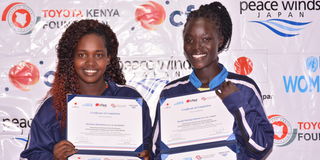Female refugees graduate after automotive training

Micheline Nikundana (left) and Brenda Kwemoi are among the 15 women refugees who received automotive training certificates at Toyota Academy, Nairobi, on February 3, 2023, after a six-month training.
What you need to know:
- 15 women from Kakuma Refugee Camp graduated with certificates in automotive training last week.
- The program was funded by Peace Winds Japan, UN Women and the government of Japan.
- Brenda Kwemoi, one of the beneficiaries of the six-month-program had previously lost hope of ever joining college.
Women in marginalised areas barely have access to education opportunities. For 15 young women from Kakuma Refugee Camp, however, fortune came knocking when they graduated from Toyota Academy, with certificates in automotive training last week.
Brenda Kwemoi, 24, is among the beneficiaries of the six-month-program. Prior to this training, she had lost hope of ever joining university or any other college for that matter.
“I was constantly in and out of high school because my family could not prioritise paying school fees. There are more pressing needs in a refugee camp such as buying food. At some point, I even missed a full academic year,’’ Ms Kwemoi shared.
Although she tried her best, she only managed to score a D+ in Kenya Certificate of Secondary Education (KCSE). She knew it would be difficult for her to join any public university with that grade.
After completing high school in 2018, she did odd jobs in and out of the camp, like washing clothes and taking care of her sister’s children.
Technical training
“I was disheartened because I knew that if I did not acquire any skills, I would not be able to work and help my family. Most of my friends gave up and got married, but I decided to wait a little longer,’’ Ms Kwemoi said during the graduation ceremony held at Toyota Academy in Nairobi.
Early last year, she heard through friends, that a vocational institute was offering scholarships for technical training.
“We had to choose from hospitality, hairdressing and automotive training. A lot of people expected me not to go for automotive training because it is seen as a man’s job, but I wanted to challenge myself,’’ she said.
The program was funded by Peace Winds Japan, UN Women and the government of Japan.
Speaking at the event, Akiko Chiba, the country representative for Kenya Mission Peace Winds Japan said they had a hard time finding women to train for the program.
“Generally, women are the minority in the automotive industry. There are almost no women in garages in Turkana where strong gender norms still persist. However, this does not mean we picked the graduates just because they were female. We chose young women who have a huge potential to help their community,” Ms Chiba added.
She also shared that the young women would return to their community and work at Kalobeyei Garage, located in an integration settlement in Turkana.
Apart from automotive training, the women were also trained on leadership and entrepreneurship, so that they can help other women in Kakuma refugee camp to take interest in education opportunities.
Informal sector
Commending the graduates, Deputy Director Compliance and Enforcement at TVET Authority (TVETA) Dr Paul Wanyeki, urged the young women to advance their careers even after obtaining their certificates.
“The government recognises technical skills and apprenticeship in the informal sector as viable pathways to the world of work. Since most of the young women have already been prepared for the workplace, after six months, get your certification with the National Industrial Training Authority (Nita), you do not need to go to the university,’’ Dr Wanyeki advised.
The training is a pillar of hope for women living in refugee camps, as Ms Kwemoi promised, “this is just the beginning for me. I will go even further than this,’’





